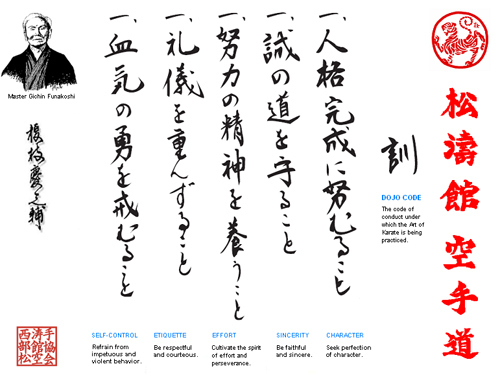DOJO KUN

Everyone who trains in karate must know the dojo kun.
At the end of each training session—whether it be at the dojo, after class, or after a tournament, which I always call “special training”—the dojo kun is repeated all together by the students as a reminder of why we train. The dojo kun states the basic philosophy of karate, according to its founder and our teacher, Master Gichin Funakoshi.
Master Funakoshi believed that, for the true karate-ka, the dojo kun should not only be considered a set of rules of conduct in the dojo, but a guide to everyday life.
Everything we learn in the dojo, we should apply to everyday life.
The following dojo kun is taken from the 20 precepts of Master Gichin Funakoshi. It should be recited out loud one line at a time, first by the dojo's sensei or senior sempai, and then repeated immediately afterwards, in unison, with pride, by all the students in attendance prior to the final bows.
IMA family has added a final affirmation to the traditional list, to encourage love and respect in all relationships:
"LOVE YOURSELF AND LOVE OTHERS"
Spoken with Pride
The dojokun is a type of shrink wrap agreement that comes with karate.
"By breaking this seal you agree not to go around mouthing off, bullying people, and generally creating mayhem that might encourage the government to come and burn down our karate school. You agree to try hard in class, attempt to better yourself and others, and behave the way that we expect you to."
The spirit to fight will be achieved as one gains more confidence through development of stronger techniques. Train to bring out the spirit, to pursue the highest objectives, not only to fight but also to overcome personal problems especially in times of sickness, domestic crisis or business problems.
It is a long path to develop these spiritual values but once the concept is understood and experienced it will provide a lifetime benefit of inner strength and peace.
To be faithful is a strong samurai tradition and an extension of the Confucius influence on the family and martial arts. It means that you have to be true to other people, to your obligations—but it also means you have to be true to yourself. And to do so means you have to do your best in everything you do.
When you are faithful to yourself, others will have faith in you. This creates mutual trust between people.
Being faithful to yourself is essential to realizing the first goal of being the best person you can be. The faith and loyalty extended to the sensei will be rewarded, in that a greater amount of knowledge and wisdom will be passed on to the student and this bond between sensei and student is extremely valuable and is the basis of the learning relationship.
If you don’t endeavor to do your best, you are not being faithful to yourself and others, and you are not trying to seek perfection of character.
The endeavor must be of a sincere nature and not just superficial. Serious effort on the part of the student will be recognized by the sensei who will in turn spend more time with him or her.
Gichin Funakoshi stressed that karate begins and ends with etiquette. He also stated that without courtesy there is no dojo. This is a reflection of the formal nature of the Japanese people and may be observed bowing during training as well as at home or office.
Dojo etiquette is well defined. You bow correctly and show respect in everything you do and everywhere you go. Respect is extended to all...senseis, parents, educators, law, deceased, nature, etc.
A person of character can walk away from a fight because he is in control of his emotions and is at peace with himself. He does not have to test his abilities on the street. He wins without fighting and he will have no regrets because no one will be injured.
If you are forced to defend yourself as a last resort, then it is all right to do so. But you will only be successful defending yourself when you maintain a calm, clear mind, in which case using karate technique to protect yourself will truly be your reaction of last resort.
Funakoshi's (Shotokan) Principles
- Never forget: Karate begins and ends with rei. Rei has the meaning of respect.
- There is no “first hand” in Karate. (Meaning there is no first attack, karate is about self-defense)
- Karate supports righteousness.
- First understand yourself, then understand others.
- The art of mind is more important than the art of technique.
- The mind needs to be freed.
- Trouble is born of negligence.
- Do not think that Karate is only in the dojo.
- The training of Karate requires a lifetime.
- Transform everything into Karate; therein lies the exquisiteness.
- Genuine Karate is like hot water; it cools down if you do not keep heating it.
- Do not have an idea of winning, while the idea of losing is not necessary.
- Transform yourself according to the opponent.
- The outcome of the fight all depends on the maneuver.
- Imagine one’s arms and legs as swords.
- Once you leave the shelter of home there are a million enemies.
- Postures are for the beginner, later they are natural positions.
- Do the kata correctly, the real fight is a different matter.
- Do not forget the dynamics of power, the elasticity of the body, and the speed of technique.
- Always be good at the application of everything you have learned.






